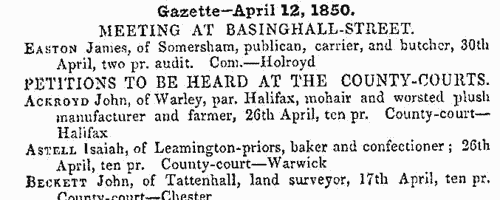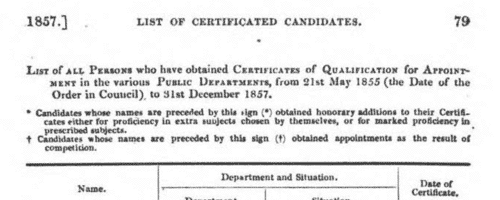Mulley Surname Ancestry ResultsOur indexes 1000-1999 include entries for the spelling 'mulley'. In the period you have requested, we have the following 101 records (displaying 41 to 50): Single Surname Subscription | | | Buying all 101 results of this search individually would cost £622.00. But you can have free access to all 101 records for a year, to view, to save and print, for £100. Save £522.00. More... |
These sample scans are from the original record. You will get scans of the full pages or articles where the surname you searched for has been found. Your web browser may prevent the sample windows from opening; in this case please change your browser settings to allow pop-up windows from this site. Dissolutions of Partnerships
(1844)
Trade partnerships dissolved, or the removal of one partner from a partnership of several traders, in England and Wales
MULLEY. Cost: £6.00.  | Sample scan, click to enlarge

| Railway Subscription Contracts
(1845)
£21,386,703 6s 4d was promised by about 10,000 subscribers of less than £2,000 per contract to the nearly 200 railway bills deposited in the Private Bill Office during the Session of Parliament for 1845. This alphabetical list gives the full names of the subscribers (surname first), description (i. e., occupation), place of abode, a numerical reference to the title of the railway, the amount subscribed to each, and total. There is a separate key to the titles of the railways.MULLEY. Cost: £4.00.  | Sample scan, click to enlarge

| Insolvents in England and Wales
(1850)
Perry's Bankrupt and Insolvent Gazette, issued monthly, included lists of insolvencies and stages in the process whereby the insolvents petitioned for release from debtors' prison. The insolvent is generally referred to by name (surname first), address and trade. This is the index to the names of the insolvents, from the issues from January to December 1850.MULLEY. Cost: £6.00.  | Sample scan, click to enlarge

|  Soldiers and staff in Wellington Barracks, Westminster
(1851) Soldiers and staff in Wellington Barracks, Westminster
(1851)
The 1851 census enumerators' books for the mass of the population record the information as in this sample scan. However, there were also separate books for the major public institutions. The instructions for the first column (Name and Surname of each Person who abode in the Institution on the Night of the 30th March, 1851) run: "Write after the Name of the Master or Head of the Institution the Names of his Wife, Children, other Relatives, and Servants; then the Names of the Officers, their Families, and Servants. Commence the list of Inmates for which the Institution is provided on another page." For the second column (Position in the Institution): "State whether the person is the Head, or an Officer or Servant, or the Wife, Son, Daughter, or other relative of such Officer or Servant. If an Inmate, state whether patient, soldier, scholar, &c." For the third column (Condition): "Write 'Married,' 'Widower,' 'Widow,' or 'Unmarried,' against the Names of all Persons except Young Children." For the fourth column (Age (last Birthday)): "For Infants under One Year state the Age in Months, writing 'Under 1 Month,' '1 Month,' '2 Months,' &c." For the fifth column (Rank, Profession or Occupation): "State here the profession, or what is believed to have been the ordinary occupation of the Inmate before admission into the Institution. Carefully distinguish in this column the different kinds of 'laborers,' and those who have been masters in trade from others." For the sixth column (Where Born): "Opposite the Names of those born in England, Scotland, or Ireland write the County, and Town or Parish. If born in the British Colonies, the East Indies, or in Foreign Parts, state the Country; in the last case, if a British Subject, add 'British Subject.'" For the seventh column (Whether Blind, or Deaf-and-Dumb): "Write 'Deaf-and-Dumb,' or 'Blind,' opposite the Name of the Person.'" Wellington Barracks was in the city of Westminster; in the parish of St Margaret and the ecclesiastical district of Christ Church; in Westminster superintendent registrar's district, and St Margaret registrar's district. There were four officers, two family members, 15 servants, and 609 soldiers and wives. HO 107/1480
MULLEY. Cost: £2.00.  | Sample scan, click to enlarge

|  Marines on H. M. S. Trafalgar in the Crimean War
(1854-1856) Marines on H. M. S. Trafalgar in the Crimean War
(1854-1856)
Sebastopol in the Crimea was the great Russian naval arsenal on the Black Sea. A combined assault by British, French and Turkish troops resulted in the reduction of Sebastopol and led to the Treaty of Paris of 27 April 1856, guaranteeing the independence of the Ottoman Empire. By Admiralty Order the Crimea Medal was awarded to sailors and marines present during the campaign, between 17 September 1854 (the first landing at Eupatoria) and 9 September 1855 (when the allies secured Sebastopol). This is the list of officers and men of the Marine Brigade borne by this ship and awarded the Crimea Medal. Her Majesty's Ship Trafalgar, a 120-gun sailing ship, took part in the assault. Four clasps to this medal were awarded to the men present in the actions at Sebastopol itself (September 1854 to September 1855), Inkerman (5 November 1854), Balaklave (Balaclava) (25 October 1854) and (the sea of) Azoff. In this list the column headed 'No. on Ship's Book' has been used to show for each man entitlement to the clasps for B(alaclava), I(nkerman) and/or S(ebastopol).MULLEY. Cost: £8.00.  | Sample scan, click to enlarge

|  Sailors and marines on H. M. S. Royal Albert in the Crimean War
(1854-1856) Sailors and marines on H. M. S. Royal Albert in the Crimean War
(1854-1856)
Sebastopol in the Crimea was the great Russian naval arsenal on the Black Sea. A combined assault by British, French and Turkish troops resulted in the reduction of Sebastopol and led to the Treaty of Paris of 27 April 1856, guaranteeing the independence of the Ottoman Empire. By Admiralty Order the Crimea Medal was awarded to sailors and marines present during the campaign, between 17 September 1854 (the first landing at Eupatoria) and 9 September 1855 (when the allies secured Sebastopol). The sailors' medals were mostly delivered to them on board ship in the course of 1856; the marines' medals were sent to their respective headquarters for distribution. The remarks as to distribution in this medal roll therefore give more specific information as to the whereabouts of the sailor recipients in 1856 than about the marines. Her Majesty's Ship Royal Albert, a 120-gun screw steamer, took part in the assault. Four clasps to this medal were awarded to the men present in the actions at Sebastopol itself, Inkerman, Balaklave (Balaclava) and (the sea of) Azoff, but the recipients of these clasps are recorded on separate rolls, not part of this index, but indexed on this site. This index also covers the Royal Albert's two tenders, the Clinker and the Grinder.MULLEY. Cost: £8.00.  | Sample scan, click to enlarge

| Traders and professionals in London
(1856)
The Post Office London Directory for 1856 includes this 'Commercial and Professional Directory', recording over 100,000 individuals. MULLEY. Cost: £4.00.  | Sample scan, click to enlarge

|  London Policemen
(1843-1857) London Policemen
(1843-1857)
The Metropolitan Police Register of Joiners (MEPO 4/334) lists policemen joining the force 1 January 1843 to 1 April 1857 (warrant numbers 19893 to 35804). The register is alphabetical, in so far as the recruits are listed chronologically grouped under first letter of surname. It gives Date of Appointment, Name, Number of Warrant, Cause of Removal from Force (resigned, dismissed, promoted or died), and Date of Removal. Although the register was closed for new entrants at the end of 1842, the details of removals were always recorded, some being twenty or more years later. Those recruits not formerly in the police, the army, or some government department, were required to provide (normally) at least two letters of recommendation from persons of standing, and details of these are entered on the facing pages: the names in these are indexed separately - this index refers only to the police constables. Where a recruit was only recently arrived in the metropolis, the names and addresses of the recommenders can be invaluable for tracing where he came from.MULLEY. Cost: £8.00.  | Sample scan, click to enlarge

|  Sailors and marines awarded the Baltic Medal
(1854-1857) Sailors and marines awarded the Baltic Medal
(1854-1857)
During the Crimean War, a British and French fleet entered the Baltic, and captured Bomarsund harbour and one of the Aland Islands (now part of Finland). Bomarsund is the sound between the islands and the Swedish island of Vardo; and at the fine harbour on Bomarsund, dominating the entrance of the Gulf of Bothnia, and indirectly that of the Gulf of Finland, the Russians had constructed a northern naval base, and this was destroyed in the attack. The British fleet taking part in the Baltic expedition comprised Her Majesty's ships Aeolus, Ajax, Alban, Algiers, Amphion, Archer, Arrogant, Basilisk, Belleisle, Blenheim, Boscawen, Bulldog, Caesar, Calcutta, Centaur, Colossus, Conflict, Cornwallis, Cossack, Cressy, Cruizer, Cuckoo, Cumberland, Dauntless, Desperate, Dragon, Driver, Duke of Wellington, Edinburgh, Esk, Euryalus, Exmouth, Falcon, Firefly, Geyser, Gladiator, Gorgon, Hannibal, Harrier, Hastings, Hawke, Hecla, Hogue, Imperieuse, James Watt, Leopard, Lightning, Locust, Magicienne, Majestic, Merlin, Miranda, Monarch, Neptune, Nile, Odin, Orion, Otter, Pembroke, Penelope, Pigmy, Porcupine, Prince Regent, Princess Royal, Pylades, Resistance, Retribution, Rhadamanthus, Rosamond, Royal George, Royal William, Russell, St George, St Jean D'Acre, St Vincent, Sphinx, Stromboli, Tartar, Termagant, Tribune, Tyne, Valorous, Volage, Volcano, Vulture, Wrangler and Zephyr. This is the medal roll of the naval and marine claimants who qualified for the Baltic Medal for service in 1854 to 1855. The medals were dispatched in batches from early 1857, the first batch being numbered B A 1, the next B A 2, &c.; then follows the destination (a place or, more usually, a ship) and the date of dispatch. Most of the medals had been sent by the end of 1857.MULLEY. Cost: £8.00.  | Sample scan, click to enlarge

| Civil Service Appointments
(1855-1857)
The Civil Service Commission published this annual list of all persons who had obtained certificates of qualification for appointment in the various public departments. The list gives full name (surname first); department (such as Post Office, or Inland Revenue); situation (such as Letter-carrier, or Clerk); and date of certificate. Candidates whose names are preceded by a dagger obtained appointments as the result of competition. Those whose names are preceded by an asterisk obtained honorary additions to their certificates either for proficiency in extra subjects chosen by themselves, or for marked proficiency in the prescribed subjects. This list covers the period from 21 May 1855 (the date of the original Order in Council) to 31 December 1857.MULLEY. Cost: £4.00.  | Sample scan, click to enlarge

|
Research your ancestry, family history, genealogy and one-name study by direct access to original records and archives indexed by surname.
|













